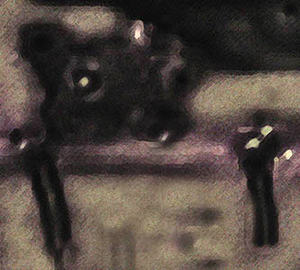The first weekend they go to Parliament Hill, where she gazes perfunctorily at the buildings before asking him what else there is to see. The buildings at the Hill are too recent, and their story too unbloody to hold her interest. She is newly arrived from a country where history is mundane, and suffering a prerequisite for worthiness. Canada confounds her; she cannot believe its unashamed acceptance of a far-away Queen’s reign.
“There are some nice views,” he offers.
He points to the river, a bridge, and a church spire, before he remembers the Cat Sanctuary. At the side of Parliament Hill is a shelter that houses two dozen stray cats, and the man who feeds and cares for them does it all for nothing. She becomes animated, says that it sounds like fun to see so many cats together.
When they reach the shelter, however, no cats are visible. A big black squirrel is nibbling at a dish of cat-food; the cats are all sleeping inside their sheds or away on their prowls. Nonetheless, she gazes intently at the shelter.
“The cats here,” she says finally, “look like squirrels.”
He’s glad that there are no tourists nearby. “That is a squirrel,” he says.
“What do you mean?”
Her legs are aching from walking uphill, she says, and she wants to go back to the house. The rest of her conversation is membraned with convent-school pronunciation, with flawless grammar.
They have been married six days.
She was the seventh girl he’d met during his trip to India that spring. She was twenty-five, an investment banker with Morgan Stanley in Bombay. He had graduated from IIT-Bombay with a bachelor’s in Computer Science five years prior, and moved to Ottawa immediately after, to work for Nortel.
They met for coffee on the first day, for a drink on the second day, and, on the third day, for dinner at a restaurant where prices were higher than in Canada. She chose the venues. She was confident and poised, insisting on splitting the check with him each time.
Though she had never been to North America, she had holidayed in Europe four times (he’d been to Germany once), and spoke of Versailles and Notre Dame in the French accent she’d learned at the Alliance Française de Bombay. After dinner she lit a cigarette, and did not make a point of observing his reaction.
He asked her to marry him that night, and she laughed and said that she liked him but needed more time. After his return to Canada, he had mailed her everyday and phoned her once a week for three months, before she had agreed to marry him, to quit her job, and to move to Ottawa.
The squirrel, she says, as they lie in bed, was horrible and upsetting. The ax-toothed, mace-tailed animal she saw did not look like the squirrels she—they both—grew up with.
Squirrels in India are brown, small as teabags and as tenderly crushable as the liqueur chocolates she loves. A squirrel, in its own humble squirrelly way, helped the god Rama during the great battle to vanquish evil. When the god stroked the squirrel in thanks, three white stripes appeared where the god’s fingers touched it—marks that Indian squirrels carry to this day, eternal souvenirs of their piety and devotion. Cats come in different shapes. Cats are often super-sized, like tigers; it’s quite natural that they might come in a smaller squirrel-size. That’s why she mistook the squirrel for a cat at the shelter, she says, it’s not that she is stupid.
Yes, he says. Yes, I understand. Of course you’re not stupid. C’mon, you used to work at Morgan Stanley, remember? He pats her hand, her back, her hair, and her shoulders. She is small and warm and squirmy in his arms, and when he remembers that she has traveled seven thousand miles to be with him in this bed, at this moment, he is rampant with astonishment and gratitude.



 The core workshop of SmokeLong Fitness is all in writing, so you can take part from anywhere at anytime. We are excited about creating a supportive, consistent and structured environment for flash writers to work on their craft in a community. We are thrilled and proud to say that our workshop participants have won, placed, or been listed in every major flash competition. Community works.
The core workshop of SmokeLong Fitness is all in writing, so you can take part from anywhere at anytime. We are excited about creating a supportive, consistent and structured environment for flash writers to work on their craft in a community. We are thrilled and proud to say that our workshop participants have won, placed, or been listed in every major flash competition. Community works.